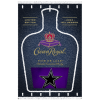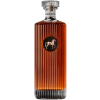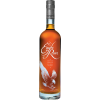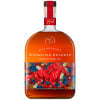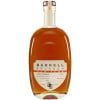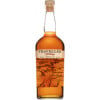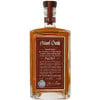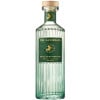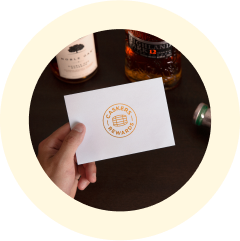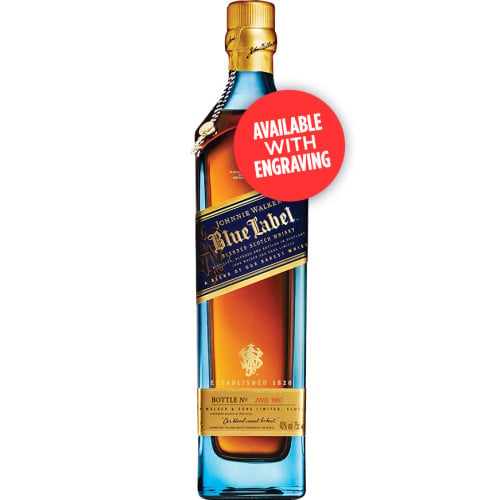About Johnnie Walker Blue Label Scotch Whisky
In 1857, Alexander Walker — Johnnie Walker's eldest son — inherited the store and began improving its selection of single malt Scotch whiskies. In addition, Alexander had apprenticed with a tea merchant in Glasgow and there, had learned the art of blending tea. Under his stewardship, the House of Walker began blending whisky and bottling it in an iconic, square bottle adorned with a slanted label. By the time Alexander Walker retired in the 1880s, whisky sales represented over 95% of the store's business.
Johnnie Walker Blue Label Blended Scotch Whisky represents the epitome of blending and the pinnacle whisky of the House of Walker. The blend was personally created by James Beveridge, Johnnie Walker's Master Distiller, and is crafted to reflect the style of whiskies produced by Johnnie and Alexander Walker in the 19th century.
"I think of blending as being like the process of writing," says Beveridge. "Is the final book just a series of words, a lot of facts and information, or has it been put together with care and attention so that the end result will relate to the person who reads it? If it does, then that, you could argue, is magic blending, like writing, like any creative process, is much more involved in the world of ideas, with trying to connect with the whisky drinker. I like to think that we have made that connection."
Knowing that only one in every ten thousand casks makes it into the Johnnie Walker Blue Label is a proof that it truly is an unrivaled masterpiece.
Johnnie Walker Blue has a subtly sweet aroma with notes of bittersweet chocolate, caramelized oranges and a touch of tobacco. The initial notes of roasted nuts and smoky chocolate are complemented by hints of rich fruits (including pears), dates, toasted bread and delicate brown spices. The finish, which is incredibly smooth, has a touch of pecan pie, milk chocolate, peppercorn and figs. The whisky earned the Double Gold Medal at the San Francisco World Spirits Competition in 2013, and earned a score of 95 points from
Wine Enthusiast Magazine.
Each bottle of Johnnie Walker is encased in a silk-lined box, and comes with a certificate of authenticity and unique serial number.
Pick up a bottle today of THE most famous premium blend in the world!
About Johnnie Walker
Johnnie Walker, one of the most widely distributed brands of blended Scotch whisky in the world, originated in the Scottish burgh of Kilmarnock in East Ayrshire. The story of the brand starts with John Walker, who started a profitable groceries business with the inheritance from his father. John Walker, himself a teetotaler, found his competitive edge in whiskies he blended himself, offering his customers a consistent product, unlike most other grocers, who usually sold a line of single malts that were never all that consistent. Whisky represented about eight percent of the sales when John’s son Alexander Walker took over the business after his father’s death in 1857, and when the company was passed on to the third generation, this share was already between 90 and 95 percent. The legalization of the blending of grain and malt whiskies by the Spirits Act of 1860 marked the beginning of the modern blended Scotch whisky. Johnnie Walker's first commercial blend, called Old Highland Whisky, was launched in 1867. Alexander Walker also introduced the brand's signature square bottle, and the distinctive slanted label. In 1893, the Walkers acquired the Cardhu distillery, and kept expanding through the early 20th century by buying interests in a number of distilleries. This ensured the company a steady supply of whiskies for its blends. By 1909, John's grandsons George and Alexander II had expanded the line, and sold three blended whiskies.
In 1909, the company rebranded its whiskies, introducing the famous striding man logo and renaming the blends after the colors of their labels. By 1920, Johnnie Walker could be bought in 120 countries. The company joined Distillers Company in 1925, and, after its acquisition by Guinness, and Guinness’s subsequent merger with Grand Metropolitan, the brand is now owned by Diageo.
About Scotch
Scotch is the most popular whisky in the world and is considered the king of them all! There are five whisky regions in Scotland (six if you count the not officially recognized Islands), and each of them produces spirits with unique properties and distinct tasting notes. (The type of grain used determents the type of the scotch.)
Malt whisky is made of malted barley, and grain whisky uses other grains like corn or wheat. Most of the time, a whisky is blended from different distilleries hence the name blended scotch, but if a malt whisky is produced in a single distillery, we get something extraordinary called a single malt.
Check out our impressive selection of scotch whiskies, find your new favorite in the Top 10 scotch whiskies, or explore our treasury of rare & hard to find scotch whiskies.
